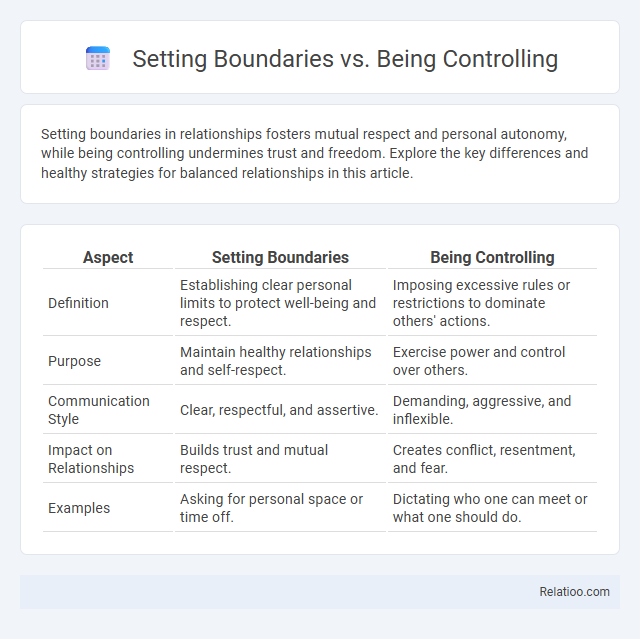Setting boundaries in relationships fosters mutual respect and personal autonomy, while being controlling undermines trust and freedom. Explore the key differences and healthy strategies for balanced relationships in this article.
Table of Comparison
| Aspect | Setting Boundaries | Being Controlling |
|---|---|---|
| Definition | Establishing clear personal limits to protect well-being and respect. | Imposing excessive rules or restrictions to dominate others' actions. |
| Purpose | Maintain healthy relationships and self-respect. | Exercise power and control over others. |
| Communication Style | Clear, respectful, and assertive. | Demanding, aggressive, and inflexible. |
| Impact on Relationships | Builds trust and mutual respect. | Creates conflict, resentment, and fear. |
| Examples | Asking for personal space or time off. | Dictating who one can meet or what one should do. |
Understanding Boundaries vs Control
Understanding boundaries involves recognizing and respecting personal limits in relationships, ensuring mutual consent and emotional safety. Control, by contrast, often entails imposing one's will on others, undermining autonomy and creating imbalance in power dynamics. Setting clear boundaries fosters healthy interactions, while controlling behavior can lead to conflict and emotional distress.
Why Setting Boundaries Matters
Setting boundaries is essential for preserving your mental and emotional well-being, allowing you to define acceptable behaviors and protect your personal space. Unlike being controlling, which involves imposing your will on others, boundaries respect mutual autonomy and foster healthy relationships. Clear boundaries prevent resentment and promote trust by ensuring that your needs are acknowledged without infringing on others' freedom.
Signs of Healthy Boundaries
Healthy boundaries are characterized by mutual respect, clear communication, and the ability to say no without guilt. Signs include maintaining personal space, respecting others' needs, and balancing autonomy with connection. Unlike controlling behavior, healthy boundaries promote trust and emotional safety rather than manipulation or dominance.
Recognizing Controlling Behaviors
Recognizing controlling behaviors involves identifying actions that limit Your autonomy, such as excessive monitoring, dictating choices, or manipulating emotions to gain compliance. Setting boundaries is a healthy practice that protects personal space and respects mutual consent, whereas being controlling crosses into imposing power and restricting freedom. Understanding the distinction helps You maintain balanced relationships and avoid unhealthy dynamics rooted in control.
Emotional Impact: Boundaries vs Control
Setting boundaries fosters emotional well-being by clearly defining your personal limits and respecting others' autonomy, which reduces stress and builds trust. Being controlling often leads to emotional harm, as it disregards others' feelings and undermines healthy relationships by imposing unwanted influence. Unlike control, boundaries promote mutual respect and emotional safety, empowering you to maintain balance and self-care without damaging connections.
Communication Strategies for Boundaries
Effective communication strategies for setting boundaries involve clearly expressing personal limits using assertive language that respects both parties. Emphasizing "I" statements helps convey needs without sounding controlling or demanding, fostering mutual understanding. Maintaining consistency and actively listening to feedback enhances trust and prevents blurred lines between healthy boundaries and control.
Respect and Autonomy in Relationships
Setting boundaries is essential for maintaining respect and autonomy in relationships by clearly communicating your needs and limits without infringing on others' freedom. Being controlling undermines trust and autonomy by imposing rigid rules or expectations that disregard your partner's individuality. Prioritizing mutual respect ensures both you and your partner can express yourselves freely while honoring each other's personal space and independence.
Overcoming the Fear of Being Controlling
Setting boundaries involves clearly defining personal limits to protect emotional well-being and maintain healthy relationships, while being controlling often seeks to dominate others' actions or decisions. Overcoming the fear of being controlling requires understanding that assertive boundary-setting is a form of self-respect, not manipulation or coercion. Developing effective communication skills and practicing consistent, respectful boundaries can help reduce anxiety about control and foster mutual trust.
Tips for Enforcing Boundaries Respectfully
Establishing clear boundaries involves communicating your limits assertively while respecting others' autonomy to avoid being perceived as controlling. Use "I" statements to express your needs and feelings, maintaining a calm tone to foster mutual understanding and cooperation. Your consistent follow-through on boundaries reinforces respect without infringing on others' freedom, ensuring healthy and balanced relationships.
Finding Balance: Empowerment Without Domination
Setting boundaries establishes clear limits that protect your well-being and promote healthy relationships, while being controlling often undermines autonomy and breeds resentment. Understanding the difference between empowering others and exerting control is crucial to maintaining respect and mutual trust. Your focus should be on fostering balanced interactions where empowerment thrives without slipping into domination or manipulation.

Infographic: Setting Boundaries vs Being Controlling
 relatioo.com
relatioo.com